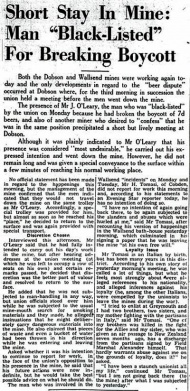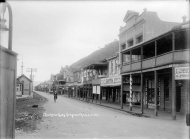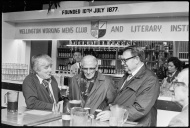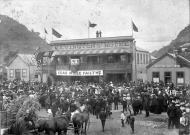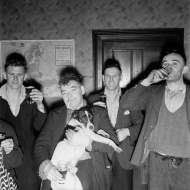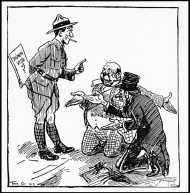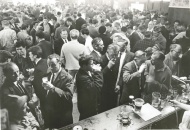Events In History
-
 9 October 1967The end of the 'six o'clock swill'
9 October 1967The end of the 'six o'clock swill'Six p.m. closing for pubs was introduced as a 'temporary' wartime measure in 1917. The resulting 'six-o'clock swill' encouraged binge drinking as patrons tried to drink their fill before closing time. Read more...
-
 7 December 1963Bassett Road machine-gun murders
7 December 1963Bassett Road machine-gun murdersThe bullet-ridden bodies of Frederick George Walker and Kevin James Speight were found in a house at 115 Bassett Rd, Remuera, Auckland. Ron Jorgensen and John Gillies were convicted of the killings. Read more...
-
 30 October 1918Massive prohibition petition presented to Parliament
30 October 1918Massive prohibition petition presented to ParliamentA petition with more than 240,000 signatures demanding an end to the manufacture and sale of alcohol in New Zealand was presented to Parliament. Read more...
-
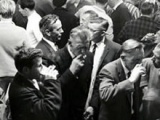 2 December 1917'Six o'clock swill' begins
2 December 1917'Six o'clock swill' beginsSix p.m. closing of pubs was introduced as a 'temporary' wartime measure. It ushered in what became known as the 'six o'clock swill', in which patrons drank their fill before closing time. The practice was to last for 50 years. Read more...
Articles
1947 Greymouth beer boycott

What would it take for West Coasters to boycott their beloved beer? Greymouth hotel-keepers found out in 1947, when an organised attempt to raise the price of beer sparked one of the most effective consumer boycotts ever seen in New Zealand.
-
Page 2 – Pub culture
Between 1919 and 1967 all public hotels in New Zealand officially closed at 6 p.m., but these hours were only nominally observed on the West Coast.
-
Page 3 – The boycott begins
In mid 1947 there were rumours that the price of beer was about to rise. It was a decision that no publican wanted to take alone because customers might move to another hotel
-
Page 4 – Industrial action
After the first week of the Greymouth beer boycott it became clear that the Licensed Victuallers' Association (LVA), supported by the breweries, was not going to yield.
-
Page 5 – Working Men’s Clubs
A number of Working Men's Clubs had been established in major urban areas since the late 19th century, but there were none on the West Coast. The beer boycott provided a
-
Page 6 – End of the 1947 beer boycott
By early December 1947 business was gradually returning to some pubs in the larger towns, but the boycott was still effective in smaller centres.
-
Page 7 – Further information
This feature was written by Simon Nathan with assistance from Margaret Hurst (National Library of New Zealand), and produced by the NZHistory.net.nz team. A note on
Temperance movement

Temperance was one of the most divisive social issues in late-19th and early-20th century New Zealand. Social reformers who argued that alcohol fuelled poverty, ill health, crime and immorality nearly achieved national prohibition in a series of hotly contested referendums.
-
Page 2 – Beginnings
Dawn of the New Zealand temperance movement, 1881-1893.
-
Page 3 – The no-license era
The 'three-fifths majority' was a major hurdle for the temperance community, but they soon mobilised to campaign for people to vote for it.
-
Page 4 – Voting for prohibition
The First World War period brought total or partial prohibition to several countries: New Zealand came within a whisker of joining them.
-
Page 5 – The decline of prohibition
Alcohol remained an important issue after the war, and the prohibitionists slogged it out with the liquor trade throughout the 1920s.
-
Page 6 – Masterton under no-license
The November 1908 licensing poll saw Masterton electorate introduce ‘no-license' and vote itself ‘dry’. Its 15 pubs closed on 1 July 1909, and remained closed
Food in the 20th century

The pavlova - that frothy, baked confection of egg whites and sugar - has long been seen as an icon of New Zealand cuisine; its place of origin has been debated with Australians for just as long in one of the many instances of trans-Tasman rivalry.
- Page 2 - Dining outBefore the 1960s, New Zealanders had a limited choice both of venue and of food if they wanted to dine
Election Days

When New Zealanders go to the polls on 26 November 2011, they will continue a 158-year-old tradition of parliamentary democracy in this country. Politics may have changed beyond recognition since 1853, but the cut and thrust of the campaign trail, the power of advertising, and the drama of polling day remain as relevant as ever.
-
Page 4 – Nights on the town
After the colour and controversy of the 1850s, election days in New Zealand have generally been orderly affairs. Even so, election nights could still be lively occasions.
Notes for My Successor

Until the late 1960s New Zealand's Governors-General were British, mainly minor aristocrats or admirals or generals.
- Page 6 - Pay and perks and handy hintsThe colonial government cut the vice-regal salary and allowances from £7500 to £5000 in the late 1880s, just when the declining British aristocracy was looking to the Empire to
Natives' Rugby Tour, 1888-89

The title of 'The Originals' was bestowed on the next New Zealand rugby team to tour Britain, that of 1905-6, but even though it was soon forgotten, the Natives' tour was to have enduring significance for New Zealand rugby and society.
- Page 7 - Unsporting behaviour? Although hacking and tripping had been banned in the 1870s to make the game safe enough to appeal to gentlemen, rugby remained
Parliament's people

\Today there are 120 MPs in New Zealand's Parliament, which is a far cry from the 37 who met for the first time in Auckland in 1854.
- Page 5 - Social lifeIn the early years, Parliament was a little like a superior gentlemen's club.
The 1960s

Five decades ago most Kiwis enjoyed a standard of living that was the envy of other nations. During the 1960s the arrival of TV and jet airliners shrank our world, and New Zealanders began to express themselves on a range of international issues, including opposition to the Vietnam War.
- Page 10 - 1967 - key eventsA selection of the key events in New Zealand history from 1967
Armistice Day

After four terrible years, the First World War finally came to a close with the signing of an armistice between Germany and the Allied Powers on 11 November 1918. New Zealanders celebrated enthusiastically, despite having recently celebrated the surrenders of the three other Central Powers and the premature news of an armistice with Germany.
- Page 7 - New Zealand in 1918Some facts and stats about New Zealand in the year of the First World War
Related keywords
- WW1 home front
- public service
- crime
- prohibition
- cartoon
- oamaru
- hotel
- temperance
- historic places
- 1980s
- poster
- tourism
- governor-general
- governor
- clothing
- protest
- drink
- greymouth
- voting
- elections
- whanganui city
- christchurch
- trade unions
- coal mining
- masterton
- six oclock swill
- west coast
- americans
- business
- parliament
- MPs
- leisure
- bellamys
- murder
- 1960s
- women in politics
- liberal party
- rugby
- sport
- maori sport
- WW1
- communism
- te reo māori
- blackball
- wellington city
- food
- dining
- cafes
- postcard
- denniston
- national council of women
- weslyans
- music
- alfred domett
- disasters
- motor sport
- economy
- 1920s
- influenza pandemic
- housing
- armistice
- religion
- population
- education
- porirua
-
Main image: Joseph Clapham, illegally supplying liquor







